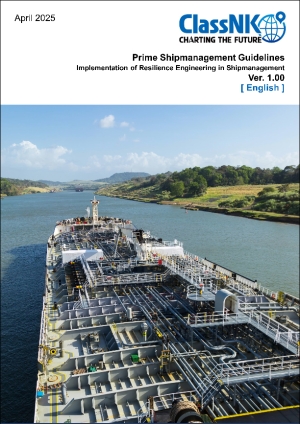


(Posted on 01/05/25)
ClassNK has released ‘Prime Shipmanagement Guidelines’ which aim to achieve sustainable ship management with safety as the highest priority. Evolving environment surrounding ship management, including fuel transition, stricter regulations, and crew shortage, ClassNK aims to enable flexible responses to unexpected situations by drawing on lessons learned from successful case studies that had not received much attention before.
At sea, where unpredictable conditions are common, case-by-case judgment is essential to ensure safe navigation. Studies have shown that the majority of maritime accidents are caused by human factors. While technological advancements and the introduction of environmental regulations have contributed to improving the safety and efficiency of ship operations and management, they have also increased the burden on stakeholders by requiring the acquisition of new knowledge and skills that were not previously demanded. Under such circumstances, relying solely on the conventional approach of eliminating risks based on past failures is no longer sufficient to ensure appropriate responses.
In response, ClassNK has focused on an approach to safety management known as ‘resilience engineering,’ which emphasizes analyzing success factors and increasing their likelihood of occurrence and achieving objectives not only through strength but also through adaptability. Based on these approaches, the guidelines present three points for advancing ship management: competency management, process management (a functional safety management system), and knowledge management.
Building upon the foundations of conventional ship management practices under the ISM Code framework, ClassNK will continue to contribute to the sustainable development of ship management not only by reinforcing robust safety management for vessels, but also by implementing various measures aimed at reducing the burden on all stakeholders.
Note:
‘Competency management’ refers to a framework for managing the skills and training required for each crew member.
‘Process management (Functional SMS)’ involves the development of clear, practical, and easy-to-understand manuals.
‘Knowledge management’ proposes a system for effectively collecting, organising, sharing, and utilising the knowledge held by the organisation, including know-how related to safe vessel operations.
AtoB@C Shipping, a subsidiary of ESL Shipping, has announced the successful delivery of Fleximar, the... Read more
Western Bulk, together with reputable Norwegian partners A/S J. Ludwig Mowinckels Rederi, Premium Maritime... Read more
Pacific Basin Shipping Limited, one of the world’s leading dry bulk shipping companies, has announced... Read more
Columbia Group anticipates a period of strong expansion as an increasing number of international shipowners... Read more
Norse?Ship Management has expanded its use of Smart Ship Hub’s high frequency sensor data and... Read more
As the maritime industry gears up to welcome the IMO’s STCW bullying and harassment training amendments... Read more
NORDEN has acquired the cargo activities of Taylor Maritime in Southern Africa (previously operated... Read more
Philippos Ioulianou, Managing Director of EmissionLink, has warned the IMO’s decision to delay... Read more
VIKAND has highlighted the need for cultural change in the maritime sector as reports of bullying, harassment... Read more
The maritime industry is experiencing a period of significant transformation, driven by rapidly evolving... Read more